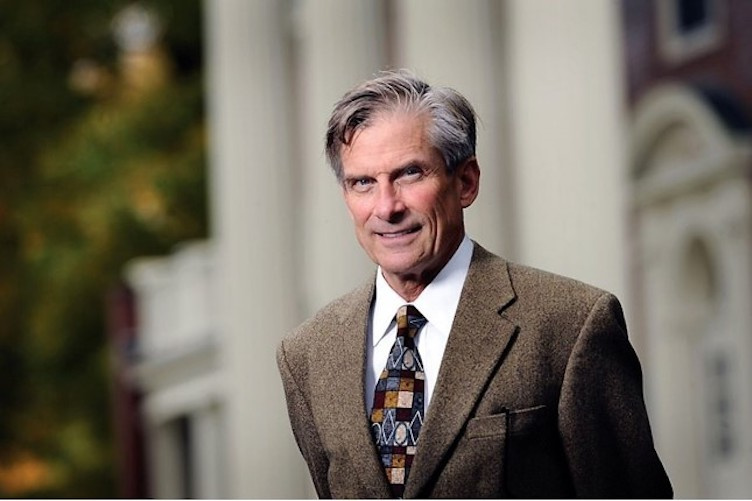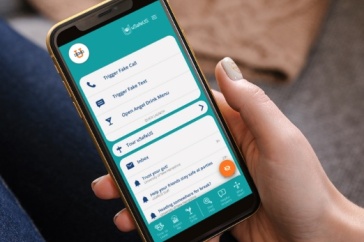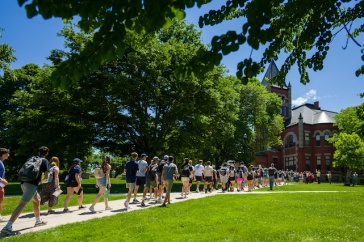
William D. Adams, former chairman of the National Endowment for the Humanities (NEH), will be on campus March 27 and 28 to discuss NEH's public humanities work and the ways in which humanists at colleges and universities can bring their perspectives and insights to bear on public life in the United States in these challenging times.
UNH Today spoke with him shortly before his visit.
UNH Today: How is digital technology making the humanities more accessible to people who aren’t in the field, those of us who wouldn’t know at a glance what the phrase ‘digital humanities’ means?
William D. Adams: Digital humanities is not mysterious. Digital technology has expanded resources for scholars to do their work, and it has given the general public ways to engage with humanities topics. In addition to large databases there have been many more specific projects that have made humanities materials accessible.
(He cites video games, which the NEH began funding several years ago, as a great example of that accessibility. “Walden, a game” lets players experience life at Walden Pond from the viewpoint of Henry David Thoreau. The “Mission US” adventure game introduces players to different eras of immigration in U.S. history through important historical figures and events. The Trans-Atlantic Slave Trade Database has information on more than 35,000 slave ships that crossed the Atlantic between 1514 and 1866. And “Mukurtu” is a powerful web tool that stores and maintains information on the history and culture of Native Americans.)
These are all platforms that have enriched public access. “Mukurtu” is a collection of cultural materials from Native American commmunities that they have organized and processed for, and with, humanities scholars. People can look at films, photos, historical records, as well as listen to music. What’s powerful is that the work is always done with and for native communities. It’s another great example of something that joins scholarly humanities work to local communities.
UNH Today: Does studying the humanities make us better people or just better informed?
Adams: I like to think it makes us deeper people. It gives us access to dimensions of human experience we wouldn’t have as solitary members of society. The humanities also are relevant to citizenship — studying the humanities makes us better citizens, since citizenship requires knowing our history, the principals of democracy and our cultural terrain.
Citizenship is a big issue for the humanities, which study the foundations and the history of American democracy. The recent struggles about removing monuments in the South is an example. You can’t have an informed discussion without knowing some of the history: why they were built, when they were built, who built them. It’s the same for race discussions. You have to have an understanding of the Reconstruction, of Jim Crow laws, and their impact on our lives.
To understand a culture, you need to know what people value and what differences there are in their values. You have to wrap your mind around that. It doesn’t mean you have to like it. You have to have empathy.
UNH Today: In what way do digital humanities help us understand, or address, the grand challenges that we face today? How do the humanities shine a light on these critical issues that impact us all?
Adams: We mentioned one grand challenge already: race relations. Others include migration and immigration, the legacy of war and conflict in the United States and what impact that has had on the country as whole, and on veterans. We need humanities tools to inform our thinking. One such tool is the documentary of the Vietnam War by Ken Burns and Lynn Novick, which the NEH helped fund. That kind of public history — what happened, how did our country get in such a terrible jam — those narratives are always very important, as are the ways the arts and humanities can help veterans understand the searing experiences of combat. There are a lot of ways in which our country’s conflicts raise questions of meaning for veterans — what happened to me, what kind of person am I now, who am I?
UNH Today: What role does higher education have in helping to solve world problems through the humanities?
Adams: Lots of universities are developing courses related to grand challenges. You gain a lot from approaching these issues through the humanities. It’s reasonable that colleges and universities would tackle such problems. I don’t think you have to be political; it’s reasonable because it’s good for students, good for faculty, good for the world to engage in these very deep questions.
UNH Today: I read that your time in Vietnam was a critical factor in the path you chose to follow. Can you speak to other influences along the way, to the choices you’ve made and why you made them?
Adams: Life happens in very surprising ways. We are not always in control of good things or bad things. I have talked about being influenced by my experience in Vietnam. And I’ve talked about being a college administrator and being at the NEH. All of these experiences have been influential in my development as a human being. NEH let me see things I never could have seen in a single institutional setting. Every part of my life has had a big impact.
I knew when I came back from Vietnam that I wanted to go into academic life because I had all these burning questions. So, Vietnam sort of made me want to understand things that had become part of my life and were problematic. My path wasn’t very orderly. When doors opened, I went through them.
Attend a discussion with William D. Adams Tuesday, March 27, from 3:30 - 4:45 p.m. in the Huddleston Ballroom or a roundtable discussion Wednesday, March 28, from 3:45 - 5 p.m. in the Courtyard Reading Room, Dimond Library Room 510. Register here.
-
Written By:
Jody Record ’95 | Communications and Public Affairs | jody.record@unh.edu



















































